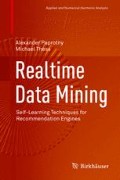Abstract
The robust measurement of the efficiency of recommendation algorithms is an extremely important factor in the development of recommendation engines. We provide some useful methodical remarks on this topic in this chapter, even though it is not directly connected to the problem of adaptive learning. We further propose a straightforward algorithm to calculate confidence intervals for REs. At the end, we discuss Simpson’s paradox which illustrates the importance of constant environment conditions for testing.
Access this chapter
Tax calculation will be finalised at checkout
Purchases are for personal use only
References
Geary, R.C.: The frequency distribution of the quotient of two normal variates. J. R. Stat. Soc. 93(3), 442–446 (1930)
Semjonow, N. Wissenschaft und Gesellschaft (in Russian). Nauka (1981)
Sieber, H., Volkmer, T.: Ein Konfidenzintervall für den Mehrumsatz bei einem A-B-Test. (in German) Documentation, prudsys AG, 2010
Author information
Authors and Affiliations
Rights and permissions
Copyright information
© 2013 Springer International Publishing Switzerland
About this chapter
Cite this chapter
Paprotny, A., Thess, M. (2013). What Cannot Be Measured Cannot Be Controlled: Gauging Success with A/B Tests. In: Realtime Data Mining. Applied and Numerical Harmonic Analysis. Birkhäuser, Cham. https://doi.org/10.1007/978-3-319-01321-3_11
Download citation
DOI: https://doi.org/10.1007/978-3-319-01321-3_11
Published:
Publisher Name: Birkhäuser, Cham
Print ISBN: 978-3-319-01320-6
Online ISBN: 978-3-319-01321-3
eBook Packages: Mathematics and StatisticsMathematics and Statistics (R0)

